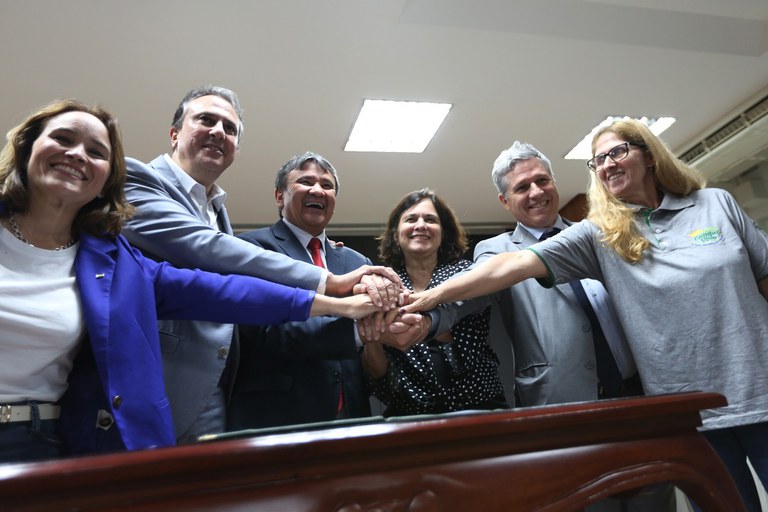Inter-ministerial agreement proposes joint actions to strengthen the Brazilian National School Feeding Programme (PNAE), which serves nearly 40 million students
Paulo Beraldo
Brasilia, Brazil, April 5, 2023 – The Government of Brazil signed an agreement to strengthen the promotion of adequate and healthy nutrition in the school environment. The axis of the action carried out on Tuesday the 4th, in Brasilia, is the Brazilian National School Feeding Programme (PNAE), which serves more than 40 million students in approximately 150,000 schools.
The Technical Cooperation Agreement (ACT) was signed by the Ministries of Education (MEC), Agrarian Development and Family Agriculture (MDA), Development and Social Assistance, Family and Fight against Hunger (MDS), Health (MS) and the National Fund for Educational Development (FNDE).
The signing was attended by national authorities such as ministers, deputies, senators, representatives of civil society, ministerial technicians and managers, and various institutions such as the Food and Agriculture Organization of the United Nations (FAO) and the Brazilian Cooperation Agency (ABC /MRE), which, together with the FNDE, execute the regional project Consolidation of School Feeding Programmes in Latin America and the Caribbean, within the framework of the Brazil-FAO International Cooperation Programme.

On the occasion, all the ministers reinforced President Lula’s commitment to reducing hunger and malnutrition indicators in Brazil, one of the pillars of government action. The Minister of Health, Nísia Trindade, praised the coordinated actions of the ministries, reiterated the commitment to such an important agenda for the country, and reinforced the perspective of food as a human right.
Wellington Dias, Minister of Development and Social Assistance, Family and Fight against Hunger, highlighted the role of the “marriage” between public purchases from family farming and institutional markets such as school feeding and other public sectors.
Paulo Teixeira, Minister of Agrarian Development and Family Farming, highlighted the determination of the Lula government to end hunger in Brazil, with measures such as the increase in the minimum wage, the increase in the PNAE budget and the launch of the Food Acquisition Program (PAA).
Finally, Camilo Santana, Minister of Education, said that the PNAE is one of the most important and respected programmes in Brazil, even internationally. It reinforced the Government’s commitment to the fight against hunger and the role of school feeding in this policy. “And this is an experience that is even known in other countries,” he said.
Camilo commented that there is no quality education without food at school. In March, the Government of Brazil increased the per capita values of the PNAE for all stages and modalities of basic education in percentages that vary from 28% to 39%. This year, R$ 5.5 billion will be invested in improving the quality of food in schools.
Inspiração
“This agreement implements an important principle of any sustainable social policy: intersectorality. The ministries come together to strengthen a school feeding policy in its various dimensions”, says Najla Veloso, coordinator of the project Consolidation of School Feeding Programs in Latin America and the Caribbean. “Family farming is also being considered not only from the point of view of production, but also from the quality of food and its consumption.”
Najla says initiatives like this have the potential to reduce food insecurity in Brazil by generating income and producing better quality food. “This alliance is an action to face the indicators of malnutrition and obesity, because it has a positive impact on the urban and rural life of millions of Brazilian students and producers”, she says.
“When we talk about all these public social policies, including the PNAE, we talk about food security, and it is about guaranteeing a healthy diet from school in a systematic and continuous way”. For Najla, the agreement is an inspiration to other countries. “This internal cooperation signed between ministries expresses more than the desire to do. It symbolizes: ‘we agree and we will be present with actions in the execution of the school feeding policy'”.


